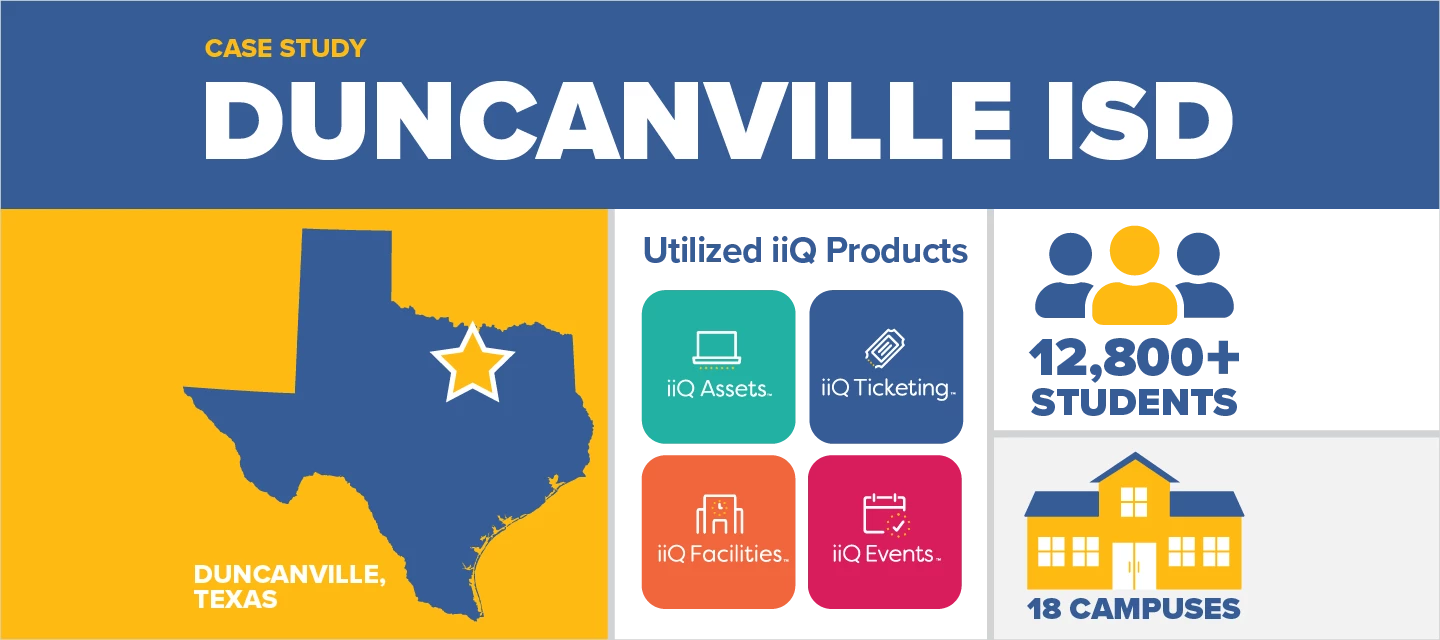The City of Duncanville is nicknamed the City of Champions because they’ve won so many state championships. Dr. Brian Brown, Chief Technology Officer of Duncanville Independent School District, incorporates that philosophy into his work as well: “We have to be the City of Champions in everything that we do. So one of the things I do as a CTO is watching the budget [and] making sure we are making the best purchases for the school district, getting what's best for our students, what's best for our staff, what's best for our community across the board.”
When the department was struggling with a legacy system that wasn’t fitting their needs for IT service management (ITSM) and IT asset management (ITAM), Dr. Brown began to research other options. He felt that Incident IQ was the best Computerized Maintenance Management System (CMMS) choice for the district because it’s made for K-12 institutions. He liked that, unlike software built for all industries, it would be tailored to the school district's unique needs. “Incident IQ is built for K-12. We could use it pretty much day one. We don’t have time to do a bunch of customizations. Being K-12 specific is important because all of the out-of-the-box ticket types are specific to education. They’re built for the problems that educators face.”
Coordination Across Teams
One issue that they wanted to address was consolidating work for other teams that were supporting school operations. With various departments using different tools, it created silos of information and difficulties communicating tasks to be done. There was also the complication of managing prep for events, which involved manually creating tickets for IT and Operations based on information in a separate event management software.
Dr. Brown said, “We had our facilities, asset management and IT ticketing together, but we had a separate tool for events. So we were [manually] generating tickets from the event system. They were emailing me and then I was forwarding those tickets into Incident IQ to create tickets for my team. So, very quickly operations had issues. Warehouse has to deliver tables and chairs. Transportation has to arrange buses. Maintenance, the HVAC guys, have to make sure the AC’s on. And if they need power, somebody on the maintenance team has to run power like electrical cords. All of those types of [tasks], we’re manually having to transfer from our event system into the ticketing system so our facilities and maintenance guys could go out and do the work. And that’s when we saw the benefit of having these tools interconnected inside iiQ. Now, when you go in and create an event, it creates all the tickets. Nobody’s having to do anything. It does it all in the background.”
This has been crucial, considering the district does three to four thousand events per year for internal and external groups, and they want to get it right for each one. With the ability to tailor questions in their event reservation forms, the district has been able to add all the fields they want captured. Anything a user indicates they need for an event, the system will generate a work ticket for and route to the appropriate team. They can make sure the grass is mowed for outdoor events, security is present when requested, and any other details that need to be in place for events, are taken care of.
Efficiency in Action
The district also uses Incident IQ to automatically handle event fees for external organizations using school spaces. The system calculates fees based on specific parameters, like what type of organization it is and how long they’re using the space, and then sends a bill. This has been a huge step in saving staff time because fees used to be calculated and billed manually.
Dr. Brown emphasizes again that efficiency and finding ways to improve processes to help students is the most important thing to his department:
“We are absolutely short-staffed. We’re sitting at about 13,000 [teachers and students] that are supported by five field techs [and 85 Operations team members]. So it is really mission critical that we get tools that allow them to be efficient. So when you say, how does having a tool like Incident IQ benefit students? Well, it benefits from us being able to service things quickly and efficiently, having the different add-ons, the different pieces to manipulate the tool to the workflows that we need to have happen.”
With the Incident IQ platform, the team has found ways to automate manual workflows, connect different department’s work, and streamline event management. What’s really extraordinary here is that a simple change—integrating a K12-specific CMMS—has unlocked a new level of excellence for Duncanville without requiring more staff or excessive resources. With a small team handling upwards of 3,000-4,000 events per year and supporting nearly 13,000 students and staff. Dr. Brown stated simply, “Incident IQ helped us create efficient workflows and communications with event requesters, saving over 500 hours a year in event preparations”. Championship work for the City of Champions.
Would you like to download your own copy? You can grab an Events-specific PDF here: Download Now. If you’re more focused on IT, find our IT-specific PDF here: Download Now.



